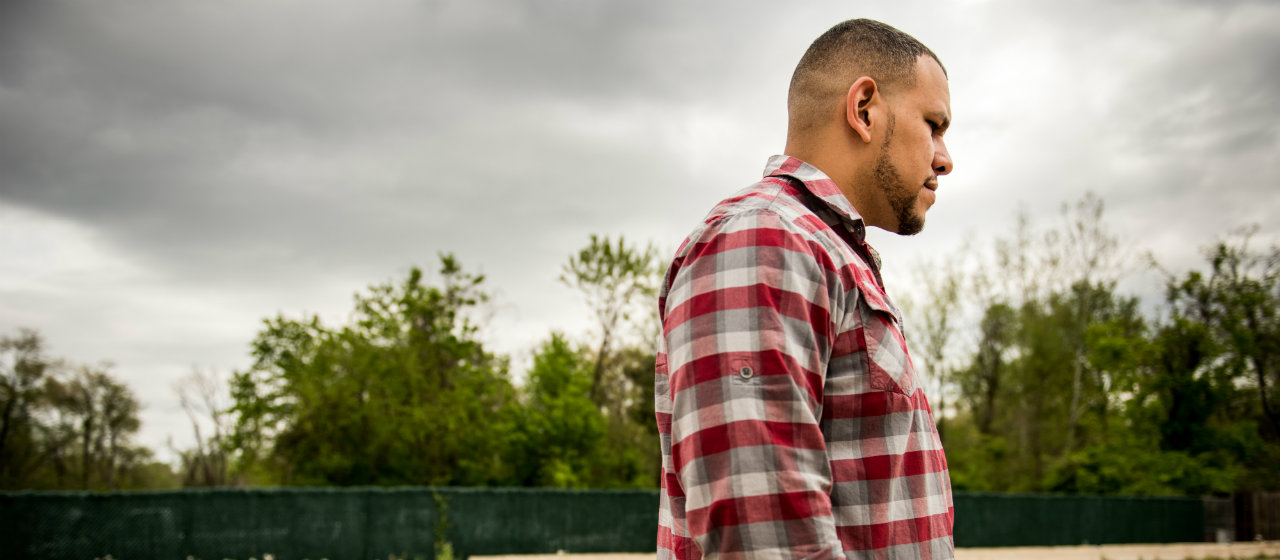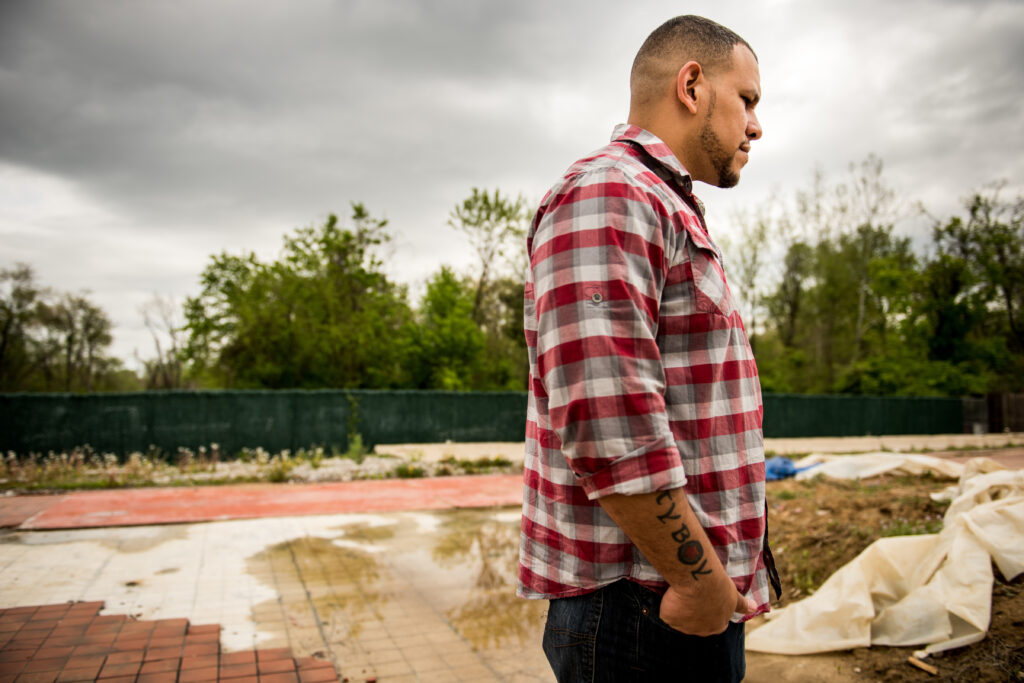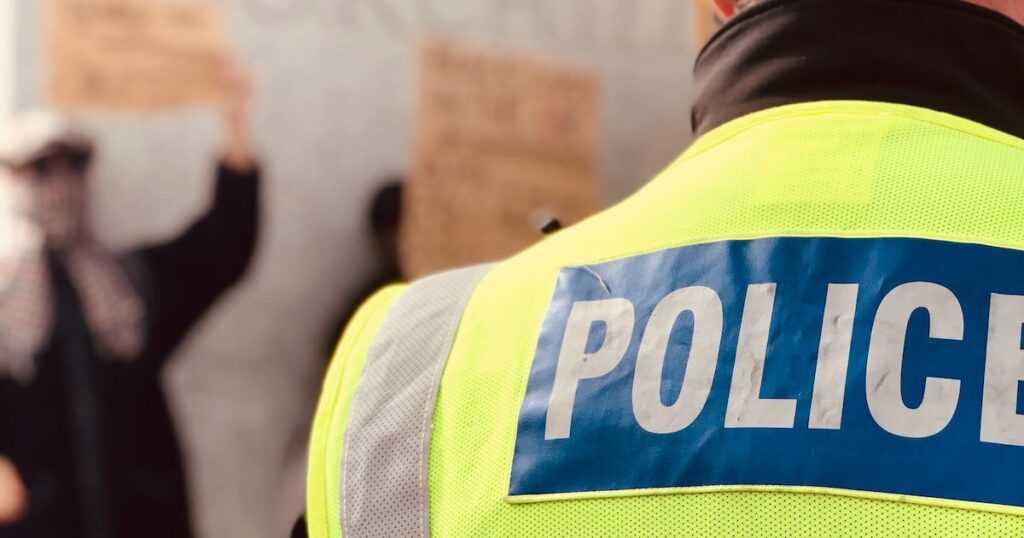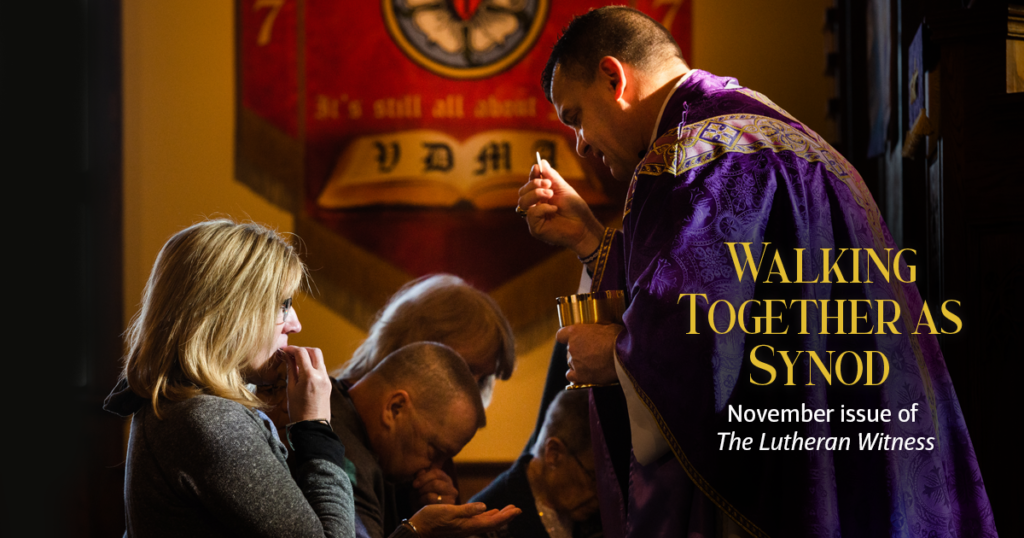
by Rachel Bomberger
“I’m here,” says the Rev. Micah Glenn from his desk at the Lutheran Hope Center in Ferguson, Mo., “because I’m black, and I’m from Ferguson.”
A national missionary called through the Mission Field: USA initiative, Glenn “could not have foreseen” returning to his hometown after seminary — Ferguson is economically hard-hit, up to 90 percent unchurched and an unlikely spot for a Lutheran mission station — but as soon as he received the call, he knew it was where he needed to be.
“I was forged by the streets here,” he says. “I can get right to ministry — right to mercy — because I’ve been where they are.”
Born into a “broken, dysfunctional family” — to a father whose military career left Glenn practically fatherless in early childhood and a mother whose interracial marriage was a constant source of tension in her white family — Glenn moved to Ferguson at age 11. He attended the local public schools for three years until, concerned by his growing behavior problems, his parents enrolled him in Lutheran High School North in nearby St. Louis. After graduation, he hoped to attend Concordia University Chicago, River Forest, Ill., to become a teacher, but when he failed to raise enough financial aid to cover his tuition, he instead began “working full time — and partying full time.”
Glenn remembers his time as a volunteer youth counselor at Chapel of the Cross Lutheran Church as a turning point in his life. “You seem to have a gift for this,” he recalls someone telling him. “You should go into ministry.”
At the age of 25, Glenn tried Concordia Chicago again — this time, with a financial aid package that worked for him — and later graduated with a degree in chemistry. After five years at Concordia Seminary, St. Louis, he found himself right back where he started: in Ferguson.
The Lutheran Hope Center that Glenn now leads was founded by a partnership of five area churches and other organizations and is housed in the new Ferguson Community Empowerment Center. The center opened July 26 and is located on the site of a former QuikTrip gas station — a building burned to the ground during violent protests following the shooting death of Michael Brown by a white police officer in August 2014.
Three years after those protests, Ferguson remains a powerful symbol of racial tension in America — and for good reason. The majority black community remains troubled and uneasy, and many residents continue to struggle daily. Family instability leads to academic underachievement. A high rate of functional illiteracy contributes to a high rate of unemployment, which in turn contributes to high rates of crime and substance abuse (which are themselves often linked).
“Drugs are always available,” says Glenn. “It’s the easiest way to make money. There’s no job application required.”
The Lutheran Hope Center is intended to help change the narrative in Ferguson. Its first major initiative, an after-school reading and literacy program called “Readers to Leaders,” seeks to tackle a leading cause of both poverty and crime by connecting volunteer educators with at-risk children.
“One of the most common factors among inmates is illiteracy,” says Glenn. “This is the cold, hard reality of it.” Underfunded schools in the community, he says, “can’t afford to hold kids back,” which means that many young people graduate high school at less than a third-grade reading level.
Through his work in pastoral care and counseling, Glenn is not only helping to teach kids to read. He is also bringing the Gospel to their entire families — many of which are headed by single mothers whose husbands or boyfriends (a large number of whom are incarcerated, often for selling drugs in an attempt to provide for their families) have left them abused, abandoned and impoverished.
“These are the ‘widows’ of our day,” says Glenn, referencing Bible passages like James 1:27, which exhorts Christians “to visit orphans and widows in their affliction.”
Challenges facing Glenn’s ministry (and there are many) include the constant need to raise funds — both for the Lutheran Hope Center and to support his own expenses as a national missionary — and a general lack of awareness about racial realities in the LCMS, a church body that (according to a 2014 Pew Research survey) is 95 percent white. Glenn often finds himself the only black man in the churches he visits, and though most congregations have been welcoming and receptive to him, he has at times encountered both ignorance and bigotry in his work.
Even so, he has hope that the LCMS can and will become more racially diverse over time.
“Our theology allows us to overcome this,” he says.
Glenn understands why many are tempted to ignore the problems facing non-white communities: “Who would want to have to feel the pain that non-white people are feeling if you didn’t have to?”
But, he says, “As a Church, we don’t have the luxury to not feel that pain. Jesus calls us to it.”
Glenn sees exposure and integration as key to overcoming racial divides in the Church: “It’d be very hard to hate black people [or for black people to hate white people] if you knew a bunch of them — and especially if you knew that they were your brothers and sisters in Christ.”
Also key to welcoming people of diverse backgrounds into the Church is being able to translate the richness of Lutheran theology into language that can be easily understood, regardless of educational achievement. People in Ferguson with lower-than-high-school reading levels, says Glenn, “can’t easily understand words like ‘salvation’ and ‘justification.’” Though pastors are trained to help Christians become more theologically literate over time, he feels that vocabulary should never be a stumbling block to faith.
Multiracial ministry, Glenn says, is also best done with awareness and sensitivity about deep-seated cultural differences. What makes us Lutheran, he reminds us, is our theology, not our Jell-O salads.
“Expecting people to adopt the culture along with the theology — it’s not realistic,” says Glenn. “People don’t have to be German to be Lutheran. They need to be baptized. They need Jesus.”
As he visits churches to raise awareness and funds for his ministry, Glenn challenges congregations to join him in “a new way of doing urban ministry” by getting to know the needs of the people living near them, regardless of their racial or ethnic backgrounds.
“Congregations don’t know their neighbors,” he says. “I’m trying to get them excited about doing outreach in their own neighborhoods.” This approach requires a huge cultural shift for many of the churches he visits, but, says Glenn, “They’re responding in a faithful way.”
For churches that want to do a better job of reaching out to the diverse communities around them, Glenn offers simple advice:
“Go into the community. Knock on doors. Tell them, ‘We’re here for you if you ever need anything.’ After you’ve done that, follow up. Ask them about themselves. Then invite them to church.
“If they do come, talk to them. Make them feel welcome. Explain what you do and why. Don’t expect them to figure it out all on their own. Help them become part of your life together.”
Rachel Bomberger is managing editor of The Lutheran Witness.
Editor’s note: this article is one of six “Snapshot” stories that appeared in the November 2017 print edition of The Lutheran Witness. Other “Snapshots” in this issue examined the experiences of Lutherans in K-12 education, parish administration, international missions, disaster response, and seminary.
[box type=”note” border=”full” icon=”none”] [icon name=”check-square-o” class=””] Subscribe to the Lutheran Witness.
Print and digital subscriptions are available through Concordia Publishing House. [icon name=”caret-right” class=””] Subscribe Now [/box]





Good to read this, and yet the people I know best in Ferguson are activists. They seem more tenacious in their compassionate commitment to people’s futures than the church world.